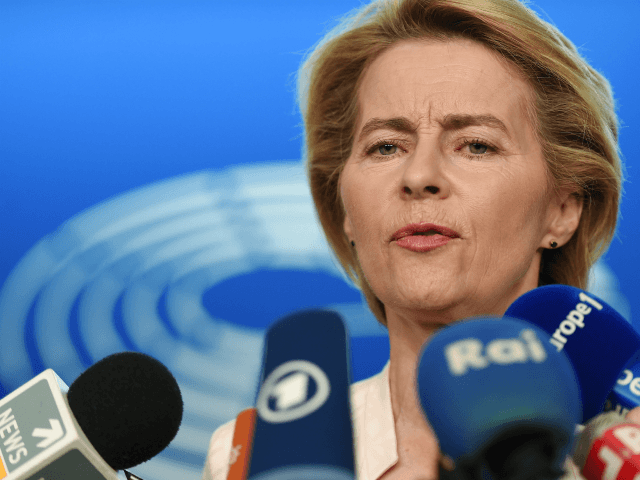Open borders activists have criticised the “fascist rhetoric” and “deeply worrying” new vice president commissioner role of “Protecting Our European Way of Life” — despite the role focusing on integrating migrants and working on a new EU asylum pact, not stopping mass migration.
The next European Commission president and former German defence minister Ursula von der Leyen has revealed nominations for a new college of eight vice presidents, naming Greek former Commission spokesman Margaritis Schinas as the vice president for Protecting Our European Way of Life, a role intended to respond to the rising number of migrants in the bloc that have been arriving since the 2015 migrant crisis.
Leftists have immediately attacked the job title, claiming protecting the European way of life, as it is phrased, is “fascist rhetoric”.
Labour’s London MEP Claude Moraes told the i newspaper that the job title was “deeply worrying and deeply insulting”, saying: “I will challenge this designation in the upcoming Commissioner hearings because it goes against any idea of an open and inclusive Europe and uses the phraseology of an authoritarian Europe which we have long left behind.”
Amnesty EU said: “Linking migration with security in the portfolio of the ‘Commissioner for Protecting our European Way of Life’ risks sending a worrying message. People who have migrated have contributed to the way of life in Europe throughout its history.”
British Green MEP Molly Scott Cato told the Independent news website: “This looks like the portfolio to fight back against the rise of the fascists, but only by adopting their divisive rhetoric around ‘strong borders’.
“What Greens value about our European way of life is our role as a beacon of compassion and diversity. We will continue our work to ensure that Europe remains a safe harbour for those fleeing persecution and to champion global human rights.”
While Dutch liberal MEP Sophie in ‘t Veld said: “The implication that Europeans need to be protected from external cultures is grotesque and this narrative should be rejected.”
EU Plots ‘Proactive Approach’ for Boosting Legal Migration to Europe https://t.co/17YV4TlscH
— Breitbart London (@BreitbartLondon) April 2, 2019
However, as the mission letter to Mr Schinas outlines, the role is not focused on strengthening external borders and increasing the deportation of illegals as the first response to the migrant crisis, but protecting the bloc’s progressive-globalist “European Values” through institutionalising the welcoming and integration of migrants from the developing world — formulating under a new job title essentially what Brussels has been working towards for years.
Citing a “declining workforce” and “basic skills gap” in Europe, Mrs von der Leyen tasked the new vice president with “focus[ing] on creating pathways to legal migration to help us bring in people with the skills and talents our economy and labour market need”.
Mr Schinas will also be expected to “coordinate the work on inclusion” of migrants, and “lead the Commission’s work on making our communities more united and cohesive. As part of this, you will coordinate the work on improving the integration of migrants and refugees into society.”
The president-elect wrote to the Greek Eurocrat that he will be in charge of developing a new asylum policy, likely to mean some form of EU-wide migration rules and forced migrant redistribution, something the bloc has been attempting to agree upon since more than one million migrants from the Middle East were welcomed into the EU by Germany Chancellor Angela Merkel four years ago.
Hinting at right-populist and conservative governments in eastern Europe that reject mass migration as the solution to demographic decline, the German said the vice-presidential nominee would be “building bridges between those most entrenched” to find “common ground” which would result in “a New Pact on Migration and Asylum”.
“We need to look at all aspects, including external borders, systems for asylum and return, the Schengen Area of free movement and working with our partners outside the EU,” she continued.
Further in the letter, she added that his role would contribute to formulating an EU-wide “European Security Union” — likely meant to complement the European Defence Union, a favourite project of von der Leyen, and the first step towards an EU army.
Farage: Von der Leyen Wants to Build ‘Updated Form of Communism’, Advance EU Army https://t.co/WvcFetxY43
— Breitbart London (@BreitbartLondon) July 16, 2019

COMMENTS
Please let us know if you're having issues with commenting.